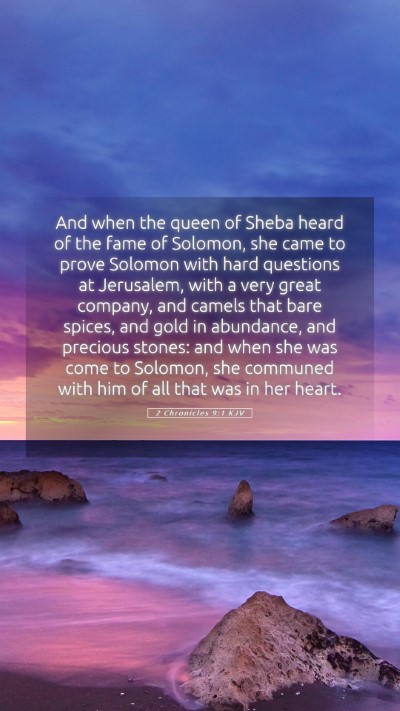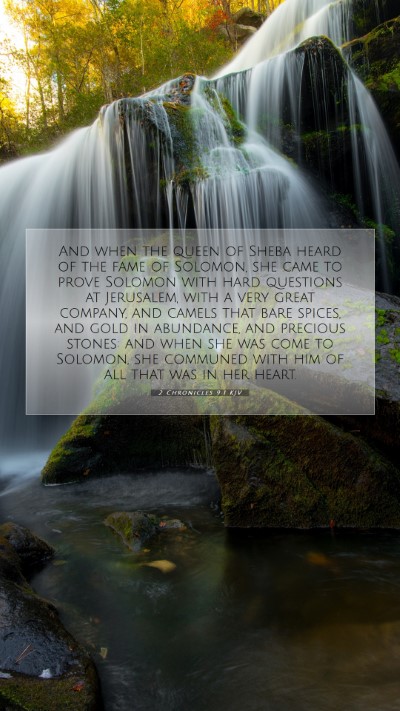Understanding 2 Chronicles 9:1
2 Chronicles 9:1 serves as a pivotal moment in the narrative of Solomon's reign, highlighting not only his wisdom but also the international recognition it garnered. This study delves into the meanings and interpretations of this verse utilizing insights from public domain commentaries, notably those of Matthew Henry, Albert Barnes, and Adam Clarke. The exploration of this passage provides valuable Bible study insights for individuals seeking greater understanding of Scripture.
Text of 2 Chronicles 9:1
"And when the queen of Sheba heard of the fame of Solomon, she came to prove him with hard questions."
Verse Explanation
The verse elucidates a significant event in the life of Solomon, where the famed Queen of Sheba visits him. This encounter is emblematic of the far-reaching influences of Solomon's wisdom and wealth. Each commentary provides unique angles for understanding this passage.
Insights from Matthew Henry
Matthew Henry emphasizes the significance of wisdom as a key attribute of Solomon. The visit of the Queen of Sheba was not merely a curiosity, but a testament to Solomon's renowned reputation. She sought to test his wisdom with challenging questions, which reflects a deep intellectual engagement. This interaction serves as a metaphor for the pursuit of divine wisdom, presenting a model for readers on how to seek understanding in their own lives.
Insights from Albert Barnes
Albert Barnes focuses on the broader implications of this inquiry. He notes that the fame of Solomon had spread far beyond Israel, bringing dignitaries and royalty to witness his wisdom. The passage illustrates the importance of reputation shaped by one's character and virtues. The queen’s visit embodies a quest for truth and fellowship—a call for all to engage in Bible verse commentary and exploration of knowledge, not only for personal edification but also for communal growth.
Insights from Adam Clarke
Adam Clarke provides a historical context to the Queen’s visit, highlighting Sheba's geographical and cultural significance. He notes that Sheba likely refers to parts of modern-day Yemen, indicating the extent of Solomon's influence. Clarke emphasizes that through intercultural exchanges, wisdom and knowledge can flourish, suggesting that true understanding often requires seeking insight from diverse perspectives. This point aligns with the broader theme of Bible study resources encouraging synergy of knowledge across varied histories and backgrounds.
Key Themes
- The Pursuit of Wisdom: The Queen's visit is a reminder of the value placed on wisdom in biblical context, encouraging readers to desire wisdom in their own lives.
- International Relations: This event signifies the political and diplomatic ties fostered through wisdom, suggesting that the wise often attract others.
- Reputation and Legacy: Solomon’s lasting influence serves as a lesson on building a legacy based on virtuous character and integrity.
Applications of the Verse
In applying this verse to daily life, individuals can reflect on their own pursuit of knowledge and wisdom, considering how they engage with others in finding truth. This can culminate in personal reflections, discussions in Bible study groups, or engaging in online Bible study platforms.
Cross References
- 1 Kings 10:1-2 - The visit of the Queen of Sheba is elaborated further with additional details of her inquiries and observations.
- Matthew 12:42 - Jesus cites the Queen of Sheba as an exemplar of those who seek wisdom.
- Proverbs 3:13-18 - A description of the value of wisdom and understanding in one's life journey.
Conclusion
2 Chronicles 9:1 serves as a profound reminder of the importance of seeking wisdom and the global interactions that can arise from it. The insights from renowned biblical commentaries shed light on the deeper meanings of this verse, contributing to a richer Bible verse understanding. As readers engage with this passage, they are encouraged to embrace the noble pursuit of wisdom and seek it earnestly as exemplified by the Queen of Sheba.


